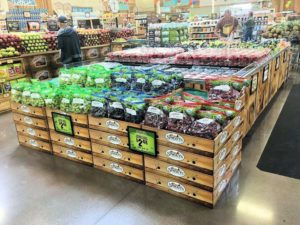Nov 28, 2022
How retailers can weather downturn in organic sales
While companies have been celebrating increased produce sales the past two years, what has led to those sales successes? Heightened advertising specials? In-store promotions?

For the third quarter of this year, organic produce sales increased about 4% while volume was down by 4.5%. In short, consumers purchased less produce but spent more money for it. The reason for the additional sales was the rise in retail pricing caused by high inflation. Even though shoppers purchased less organic produce amounts, the exceptional pricing boosted total sales.
There are justifiable reasons for raising retails. Farm production costs have risen immensely, and those higher costs have been passed on to the wholesalers and distributors. In turn, those costs have been applied to retailers who have passed them on to consumers via higher retails.
During the outset of the COVID-19 period, more consumers became interested in organic produce. While organic produce had already been increasing in popularity, COVID caused the trend to grow even more by attracting the non-organic shopper seeking safer and healthier produce.
Now organic produce volume is showing a sudden drop. As product costs began to rise over time, retailers were forced to follow that same direction on prices. And as the pricing increased, so did the resistance of shoppers as they became more selective in their purchasing habits. Since organic produce was already premium priced, further price increases have led consumers to change their buying behavior.
While conventional produce prices have risen as well, some organic shoppers are substituting those lower-priced items for their favorite organic counterparts. On other occasions, they are choosing to buy lower quantities or simply bypass items altogether, resulting in lowering the volume movement.
Due to the inflationary environment, consumers are seeking promotional sales deals and low-priced bargains. It looks like this “value-pricing” tendency will continue to build, especially when things like winter heating bills become a burden on consumer home expenses.
In order to please organic customers and also keep their loyalty, retailers should focus on the following actions:
- Maintain Your Organic Display: The worst thing to do is cut back on the organic display space. Once that occurs, customers will think the retailer is getting out of the organic business. It is important to keep the product as fully stocked as possible and show the consumer you are in the organic business 24/7/365.
- Price Organic Produce Reasonably: This is a tough one to get around. It’s important to maintain profit when costs increase, but organic pricing should not be too far above conventional.
- Promote Your Organics: Plan to advertise additional organic items. Advertising organic fresh produce will send a message to consumers that your organic produce is reasonably priced and competitive.
I personally believe that the lower volume we’re currently seeing will be temporary. We have many challenges in the produce industry and always overcome them. I have all the confidence that the organic volume will correct itself and recuperate before long.
Ron Pelger, Organic Produce Network






